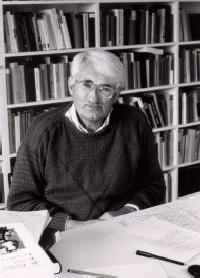
Juergen Habermas

Juergen Habermas
Habermas was a student of Theodor Adorno, and a member of the Frankfurt School of critical theory. He is perhaps the last major thinker to embrace the basic project of the enlightenment, a project for which he is often attacked. When compositionists and rhetoricians pay attention to Habermas, it is usually to pair him in a theoretical debate over issues surrounding postmodernism. Foucault, Gadamer, Lyotard, etc. are often set up as his opponents. Yet the debate always seems to be a racasting of the debate between Kant and Hegel. Habermas is decidedly Kantian in his dedication to reason, ethics, and moral philosophy.
At the center of Habermas's controversial project, as it is outlined in his written work, are the contested and problematic areas of universality and rationality. Of his theoreitcal intent and his debt to important German sociologists like Marx and Weber, Jefferey Alexander notes:
To restore universality to critical rationality and to cleanse the critical tradition from its elitism, Habermas seeks to return to key concepts of Marx's original strategy ("Habermas and Critical Theory" 50).
In many ways, Habermas is engaged in the restoration of philosophical and sociological work which has been descredited or harshly criticised. Among these are theorists such as Karl Marx, Max Weber, Wilhelm Dilthey, Georg Lukacs, Sigmund Freud, G. H. Mead, and Talcott Parsons (Foss, et. al. 241) as well as contemporary critics such as Stephen Toulmin and Jean Piaget.
Habermas
has no shortage of critics. His work is routinely criticized by postmodernists,
poststructuralists, and feminists. A particularly damning dismissal of the
political nature of contemporary critical theory is
given by Edward Said, who uses Habermas as a spokesman for theory's anti-political
stance.